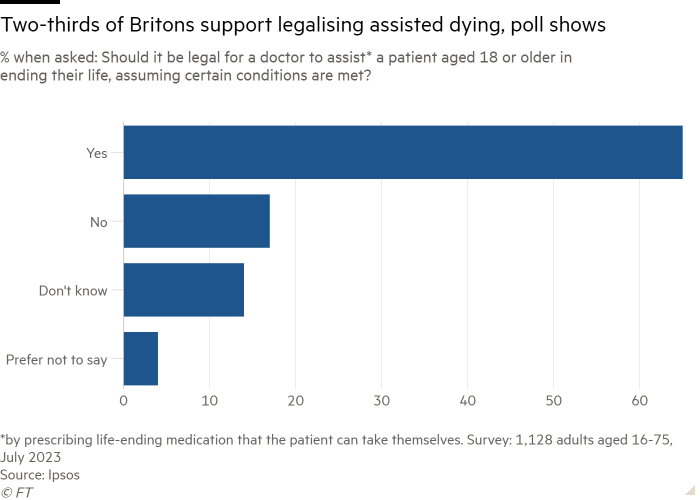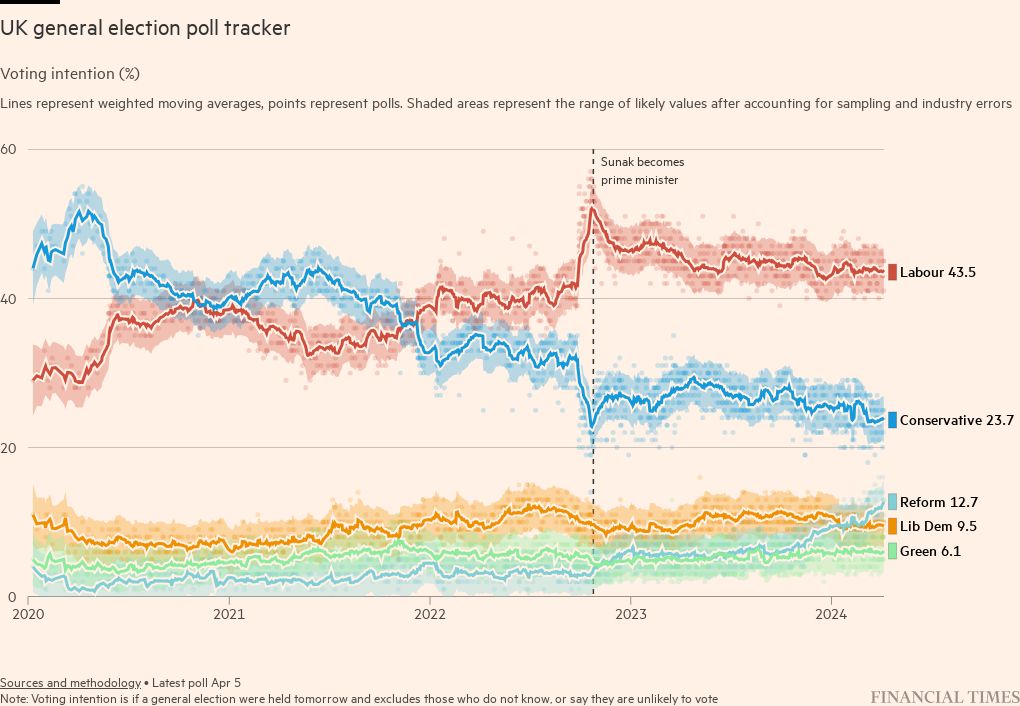Stay informed with free updates
Simply sign up to the Social affairs myFT Digest — delivered directly to your inbox.
Good morning. Will one of Keir Starmer’s policy legacies be the right to die? Perhaps: certainly opinion in parliament is moving that way, albeit at a much slower pace than the country as a whole. Some thoughts on that below.
Inside Politics is edited by Georgina Quach. Read the previous edition of the newsletter here. Please send gossip, thoughts and feedback to insidepolitics@ft.com
The next chapter
Laura Hughes has written a very powerful piece about rising support for assisted dying in the UK, and on the increase in support for assisted dying across most of the world:
“There seems to be a global momentum towards more permissive legal approaches in a wide range of different countries,” said Dominic Wilkinson, professor of medical ethics at Oxford university. “One reason for this change is that the countries’ constitutions are becoming less systematically religious and the role of religion in public policy has become less significant,” he added.
The last time MPs voted on the right to die, back in the autumn of 2015, it was heavily defeated in the House of Commons with 330 MPs voting against changing the law and just 118 MPs voting for it. However, one of those 118 MPs was the shadow immigration minister, a man called “Keir Starmer”, who obviously has a rather more impressive job title now and who is expected to have a more impressive one this time next year.

Starmer has pledged a free vote on assisted dying if he becomes prime minister. Will that mean that the right to die is one of the legacies of a Starmer government? Probably, but not certainly.
Labour MPs in 2015 were much less likely to oppose the right to die than the Conservatives, but a majority of Labour MPs who voted still did (92 Labour MPs voted against, 73 for).
Part of why is that, as Lucy Fisher wrote recently in a smart piece on the influence and enduring importance of Christianity in the Conservative party, while religious faith is on the wane in the UK as a whole, it is not declining anywhere near as quickly among the ranks of people who want to become MPs for either political party.
Nor is that a consequence of age — young rising Labour stars, such as Wes Streeting, Shabana Mahmood, Bridget Phillipson and Darren Jones are all religious. (Though they are also a useful reminder that it isn’t quite as simple as “if you’re religious you oppose assisted dying”: Streeting voted for the right to die in 2015, while Jones, who was not an MP then, has in interviews indicated a willingness to vote for it.)
I think this follows from the fact that becoming an MP is a pretty unappealing job in many ways. As a result, we are likely to see a high number of people in that position showing willingness to give up comfort and ease to help “make the world better place”. (I suspect that “new religions”, such as effective altruism, will command an outsized loyalty among MPs in the future for this reason also.)
As it stands, there is no greater concentration of committed worshippers in a small room anywhere in London — itself the UK’s most religious city — than when the parliamentary parties meet.
That’s not to say Starmer will find himself on the losing side of the vote in the next parliament — there is a shift among MPs in favour of assisted dying, and it looks to me a lot like laws mandating seat belts in the 1970s and 1980s: a question of when, rather than if. But it is to say that the campaign for assisted dying may have longer to wait than the next parliament.
Now try this
I had a wonderful weekend: among other things I went to see Swan Lake at the Royal Opera House. Music, dancing and the set were all delightful and you can watch it live in cinemas across the UK from April 24. As it was originally a Christmas gift for my partner we went to the Opera House’s Piazza restaurant, which is impressive: the food is very good, the service polite, knowledgeable and above all masterful at being speedy and relaxing.
India at the Ballot Box: Narendra Modi’s government is confident enough of election victory that it is already discussing an agenda for the first 100 days of his third term. What might this bring for business and the economy? Join FT journalists and expert guests for a webinar on April 17 13:00-14:00 GMT +1 as they unpack the business impacts of the upcoming election. Register here and put your questions to the panel.
Top stories today
-
Dowden’s affirmation on arming Israel | Britain will not offer “carte blanche” approval to Israel, which has made “big mistakes” in Gaza, but the nation is prosecuting a legitimate war and being held to higher standards than Hamas, the UK deputy prime minister has said.
-
‘Skills needs of the nation not being met’ | The next UK government must boost investment in skills training to accommodate a looming increase of 150,000 more students seeking higher education by 2030 in England, educational experts have warned.
-
Tory campaign poster pulled | The Conservatives posted a montage of images on social media, declaring Britain to be “the second most powerful country” in the world. But the poster was then hastily deleted following a breach of protocol relating to its use of an image of the King, along with other criticisms. The Times’s Mario Ledwith recounts what happened.
Below is the Financial Times’ live-updating UK poll-of-polls, which combines voting intention surveys published by major British pollsters. Visit the FT poll-tracker page to discover our methodology and explore polling data by demographic including age, gender, region and more.










